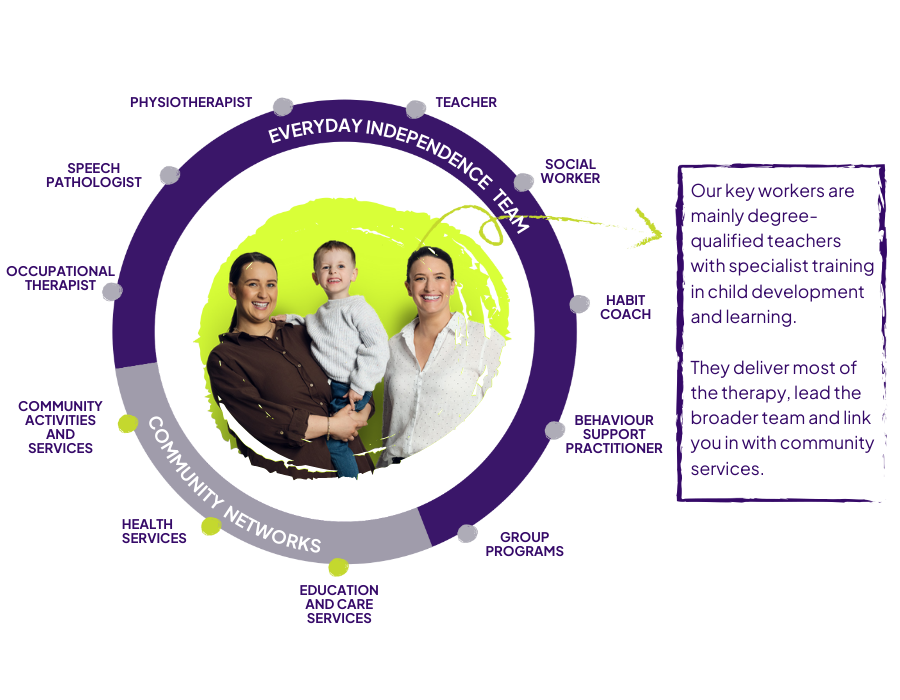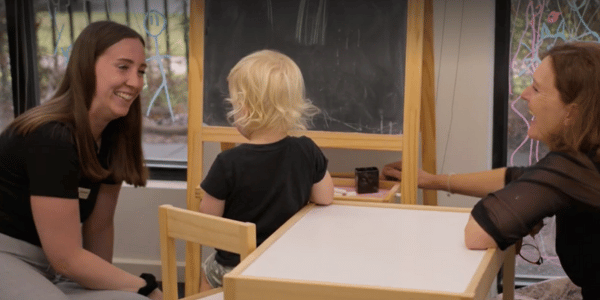
The Key Worker Model
Everyday Independence key workers, mostly trained teachers, use their knowledge of child development to help children grow socially, emotionally, physically, cognitively, and in language skills.

Our key workers lead a team of therapists and practitioners delivering early childhood intervention services. This approach facilitates a holistic approach to support children with a disability and/or developmental delay aged under nine years of age.
The key worker is the main point of contact for your child’s broader care team of therapy services, coordinating the sharing of knowledge and skills between the team.
Therapy teams may include a:
The key worker will work closely with your family to understand your child’s life, their priorities and their aspirations. They will deliver therapeutic services on behalf of other allied health professionals, building trust and ensuring consistency for your child by being a familiar face providing most of their therapy services.
The key worker model is considered best practice for achieving positive outcomes for your child and family. Having a trusted early childhood intervention professional onboard is often believed to be the driving factor in meeting the goals of NDIS participants.

The Key Worker Model
The key worker plans and oversees your child’s services. As your main therapist and day-to-day contact, they:
The most impactful way to achieve positive outcomes for your child is to have a skilled early intervention team working collaboratively to support them and their unique needs.
In order to ensure effective communication between parties, a key worker is appointed as the primary point of contact for your child and family. The key worker is experienced in early childhood development and is qualified to deliver therapy services to your child directly, drawing expertise from specialists where required.
The benefits of the key worker model include:
If your child has funding for early intervention services as an NDIS participant, you may early childhood supports delivered by a key worker and broader therapy team. The key worker will make reports to the NDIS where required.
What is a key worker expected to undertake?
Key Workers deliver most of your child’s therapy. Sessions are delivered in a space familiar to your child, such as their home, school or community. This helps your child develop skills in a real-world setting and enables the key worker to identify any barriers that may be holding them back from being included.
Funding for a key worker is typically included in the NDIS plan under the early childhood supports line item as Capacity Building Supports.
Specific details and wording may vary. If you are unsure, contact your Early Childhood Partner for clarification.
Our early childhood intervention services support children aged up to and including eight years old who are funded through the NDIS. For those aged above nine years and adults, Everyday Independence offers occupational therapy, speech pathology, physiotherapy, positive behaviour supports, habit coaching and group programs to promote their independence and wellbeing.
The key worker role encompasses a range of skills to deliver the best interventions to your child to help them reach the best possible outcomes.
A great key worker will be able to:
As a national NDIS registered provider, we have child and family teams working in 39 therapy hubs in communities across Australia. Click here to find your closest therapy hub.
Speak to our friendly team on 1300 179 131 or complete an online form and we’ll be in touch to discuss how we can assist your family.
For more information about our services, visit our early childhood supports page.
Our key workers are mainly teachers with a degree in education and specialist training in child development and learning. They will be your main therapist and day-to-day contact for all your early intervention services. They support your child and family as part of a broader team that may include speech pathologists, occupational therapists, physiotherapists, behaviour support practitioners, and habit coaches.
Our key workers use their specialised training in child development and learning to design and implement strategies across developmental areas, including social, emotional, physical, cognitive, and language. They do this in a way that engages your family and other important people in your child’s life, such as their teacher.
There are some specialised areas that only a speech pathologist, physiotherapist or occupational therapist can assess and provide advice on. The key worker will link in these team members where this support is required.
Our key workers use their specialised training in child development and learning to design and implement strategies to support your child’s development. These include activities to improve fine motor skills, language development, or strategies to help with sensory processing issues. Other members of your child’s team, such as speech pathologists, occupational therapists, and physiotherapists, can also use these strategies.
Key workers can deliver more than an individual registered occupational therapist, speech pathologist or physiotherapist as they can implement their strategies and activities as well as those designed by the team of therapists.
More frequently asked questions are available on the key worker model, the background and experience of our key workers, and how we deliver early childhood supports.
Become part of the Everyday Independence community by joining our monthly newsletter to learn about latest news and events across Australia.

